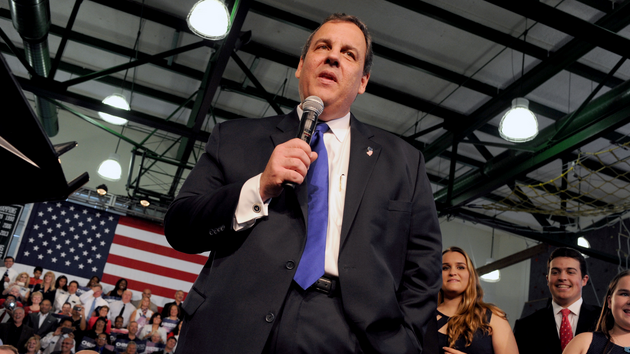
Dennis Van Tine/ZUMA
The bipartisan bill would give New Jersey courts and police greater authority to enforce current state gun laws against suspected and convicted abusers, but so far Christie has refused to say whether he will sign or veto it.
Christie’s silence coincides with what political observers see as his shift toward more permissive gun laws as he revs up his campaign for the GOP presidential nomination.
It also comes at a time when New Jersey lawmakers are scrambling to strengthen legal protections for victims of domestic violence, spurred by the June 3 murder of Carol Bowne in Berlin Township by her ex-boyfriend, a convicted felon. On June 25, the New Jersey legislature passed A-4218, the bill now awaiting action from Christie. Democrats had introduced the measure in February, but it sat in committee; after Bowne’s death, it advanced speedily.
A spokesman for Christie’s office said it does not discuss pending legislation until the governor’s office has given the bill “a thorough review.” If Christie does nothing for 45 days, the legislation will become law when the General Assembly reconvenes.
At the time of her death, Bowne was trying to obtain a gun permit for her self-defense. Christie responded to the murder by creating a commission to determine if any state firearms laws “infringe on New Jerseyans’ constitutional rights” and require modification. His announcement came on the night of June 29, just hours before he kicked off his campaign for president.
State Senator Gabriela Mosquero (D), one of the bill’s sponsors, says it is not unusual for a bill to sit for several weeks.* But Christie’s swift creation of the committee, via executive order, has caused her and other Democrats to suspect that Christie is concerned about pressure from gun rights groups.
“He quickly released his executive order as a way of showing he is serious about victims of domestic violence,” Mosquero says, adding that her inquiries to Christie’s office have been met with radio silence. “He could have signed our bill the same day. I’m not sure what he’s waiting for.”
Gun rights groups, which hold crucial sway in the GOP nominating contest, have stridently opposed any laws that bar suspected domestic abusers, abusers under protective orders, or convicted stalkers from owning guns. The Association of NJ Rifle & Pistol Associations has spoken out against the bill, claiming that it “fails to distinguish between those who commit actual physical violence, and those who commit non-violent acts, like annoying a spouse, which the law classifies as ‘domestic violence’ nevertheless.” Representatives of that group and another gun rights organization, New Jersey Second Amendment Society, did not respond to requests for comment on the bill awaiting Christie’s action.
The Democrats’ proposal makes “small but powerful” modifications to current law, Mosquero says. State law already bars domestic abusers and the subjects of restraining orders from possessing or purchasing a gun, and allows officers responding to the scene of a domestic assault to seize a suspect’s firearms temporarily. The bill on Christie’s desk would set up protocols the courts and police must follow to ensure that the subject of a restraining order actually surrenders his or her guns. It would also require prosecutors to tell alleged victims about their right to seek a restraining order—which would prevent the suspect from reclaiming his or her guns—and to petition to have the abuser’s gun permit temporarily revoked.
Republicans, in response to Bowne’s death, have just introduced a bill that would expedite the gun permitting process for alleged victims of domestic abuse, a proposition supported by Christie. Research casts doubt on the idea that purchasing a gun makes domestic violence victims safer. A study in the Annals of Emergency Medicine by researchers at Johns Hopkins University found that 20 percent of women murdered in California were shot to death by an intimate partner. Among the victims who had purchased a handgun before being killed, that number leaped to 45 percent.
In the legislature, both A-4218 and the GOP proposal have bipartisan support. When the Democrats’ bill passed the state legislature on June 25, two out of three Assembly Republicans and all but one Senate Republican voted for the measure or abstained. The “yeas” included Senate Republican Leader Thomas Kean and Sen. Jennifer Beck, one of the sponsors of the Republican bill. “If they have a restraining order against them, it means they shouldn’t have a weapon in their hands,” Beck recently told NJspotlight.com. Neither she nor Kean responded to calls for comment. Several sponsors of the Democrats’ bill have also indicated their support for the GOP measure.
In New Jersey, 33 percent of perpetrators who murder an intimate partner use a gun, far lower than the national average of 55 percent. Strict gun laws appear to make the difference. A 2014 Mother Jones analysis found that a low rate of intimate-partner homicides committed with a gun is strongly correlated with strict state laws that go beyond federal laws in forbidding convicted stalkers, domestic abusers, and individuals subject to restraining orders from owning a firearm. New Jersey has more such restrictions than all but two states.

In the past, Christie staffers have said he “supports New Jersey’s already tough gun laws.” After the 2012 school massacre in Newtown, Connecticut, Christie endorsed a ban on sales of .50 caliber rifles in New Jersey. But as he started mulling a presidential bid, Christie appeared to shift course on guns. After the state legislature passed the .50 caliber rifle ban in 2013, Christie surprised political observers by vetoing the bill. A handful of gun rights groups in New Hampshire—which holds the first presidential primary—had reportedly pressured Christie to veto the bill.
In this latest gun rights debate, Christie’s rhetoric has shifted to the right as well. His executive order creating the commission begins with a paean to the Second Amendment, stating, “it shall not be infringed.” It goes on say, “New Jersey’s laws and regulations impose significant restrictions on an individual’s ability to purchase, transport, carry, and use firearms within the State.”
Correction: An earlier version of this article misstated State Sen. Gabriela Mosquero’s name.








